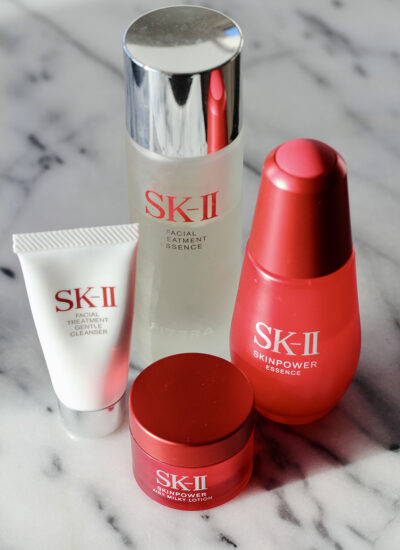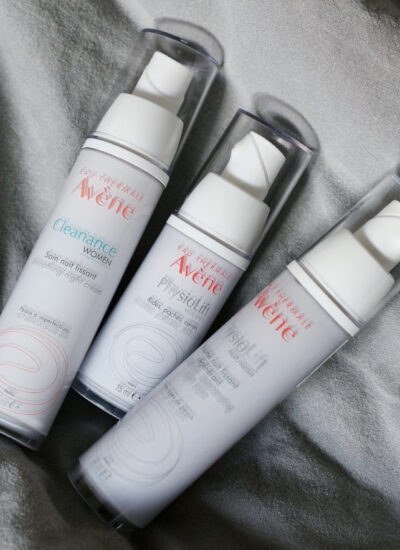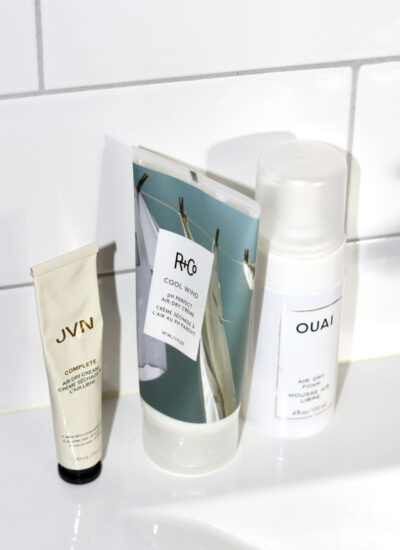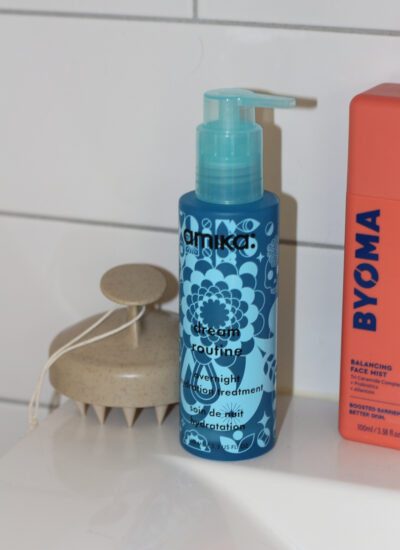
Last year, during the advent offers, I managed to squeeze the last pennies from my wallet and snagged the Medik8 r-Retinoate at 30% OFF. Even with a tempting discount like that, it still set me back well above €100! I’ve raved about it on Instagram a few times, but I’m sure you’re all wondering, is it truly worth the splurge? Stay tuned to find out…
THIS SITE USES AFFILIATE LINKS
My Skin Profile & Usage Context
Before delving into my review, let me provide some context. At the time of use, I am 27 years old with predominantly normal skin that occasionally leans towards dehydration. While I wouldn’t categorize my skin as sensitive anymore, it does have its limits with chemical exfoliants, tolerating them only 1-3 times a week. My primary concerns revolve around acne and acne scarring, including indents and post-inflammatory hyperpigmentation (PIH). As for wrinkles, I’ve recently noticed two lines on my forehead and between my eyebrows, with emerging laugh lines that are currently only visible to me. Prior to this experience, I had not ventured into using regular retinol products with a strength of 0.5% or above. It’s important to note that my usage of this product has not been entirely consistent, and I’ll provide more details on that later. With these factors in mind, let’s dive into my review!

Understanding Retinyl Retinoate: Benefits and Considerations
I won’t delve too deeply into explaining this novel retinoid alternative, as I believe the information available on Medik8’s website and other blogs suffices. There’s no need for redundancy. However, it’s worth noting that this ingredient is relatively new, and its current high price may be attributed to its scarcity in the market. My interest in trying it stemmed from its claims of being suitable for sensitive skin and its purported photostability.
Comparing Retinoid Alternatives
Supposedly, it’s less sensitizing than both retinoic acid (prescription-strength) and over-the-counter retinol. Retinoids and retinol often garner a reputation for sensitizing the skin, leading to dryness, flakiness, and increased sensitivity to sunlight. Retinyl retinoate may exhibit less sensitizing effects than pure retinol due to its slower conversion in the skin to retinoic acid(?). In terms of conversion, retinol requires two conversions, whereas retinyl requires just one. The difference lies in their time-release mechanisms. However, it’s worth noting that microencapsulated retinol products on the market may yield similar effects.
One unique aspect of retinyl retinoate is its purported ability to minimize sensitivity to sunlight, a trait not found in other retinoid alternatives. However, this may be of little consequence, as individuals may also incorporate chemical exfoliants into their skincare routine, which can also increase sun sensitivity.
Other products incorporating retinyl retinoate include Verso’s line, marketed as “Retinol 8,” and BareMinerals BB Primer, which contains a small percentage of this ingredient.
Medik8 r-Retinoate: Composition
Except for being a new type of retinoid alternative in skincare, this product also comes with the latest and most stabilized vitamin C, Ethyl Ascorbic Acid. You may have encountered it via Hylamide C25 and The Ordinary Ethylated Ascorbic Acid 15%. Deciem spilled the beans to tell us that this form of vitamin C is expensive and they, of course, are able to sell it at a reasonable price because they buy a lot of it and sell it pretty isolated.
The Medik8 r-Retinoate also comes with hyaluronic acid and vitamin E, housed in a beautiful vacuum packaging.
Not to mention that it has no added fragrance, except for the natural and faint vanilla scent from the vanilla fruit extract.
Quick Comparison: Medik8 r-Retinoate vs Verso Super Facial Serum
I had the opportunity to try the Verso-version a few times. While I can’t comment on the long-term effects, the short term felt about the same. However, Medik8’s r-Retinoate has a much nicer texture which sinks in fast leaving the skin matte. The Verso Super Facial Serum, on the other hand, has a much thicker texture that feels streaky when applied and feels more moisturizing on the skin. The Verso serum does not contain hyaluronic acid or vitamin

My Experience
Use
I told you earlier that my use has not been consistent. I believe that according to Medik8 you need to use it about 6-8 weeks straight to see the best results. Because of its milder nature, you can use this day or night and even day and night. I experimented with different times but eventually settled with only PM use because it fits better with my routine. The cream is very light and absorbable, so you can definitely layer. However, when used both day and night, and especially in conjunction with acids, it was clear that this still was a vitamin A product; causing my skin to feel dry and overexfoliated.
Later, during the year of use, I started to cycle my routine to be able to use all my actives without causing over-exfoliation. It’s said it’s good to use retinol intermittently because of the skins ability to become used to it. I don’t know how much this applies to Retinyl Retinoate? But to be able to use my acids and vitamin A without causing my skin to become an unbalanced and dry mess, I settled for r-Retinoate 3-4 days in a row per week with 3-4 nights break. During the break, I would use a chemical exfoliant once, like my Elizabeth Arden PRO Perfection Serum, which also has a slow-released retinoid-AHA-conjugate (doesn’t need converting). Or something less strong, depending on how my skin’s feeling.
Note that, if I hadn’t been using acids (especially one with vitamin A), I would’ve easily tolerated using r-Retinoate every night.
Results
It’s probably individual, but I felt like I noticed a brightening and calming effect already from the first use. However, when it comes to fighting the tiny existing wrinkles that I have, I can’t say that I’ve noticed a huge difference or one at all. But this can perhaps be because of my lack of consistency and/or my age.
I got the Medik8 r-Retinoate because of its ability to not make your skin sun sensitive. But I quickly realized that sunscreen is still a must if you want to truly reap and protect the benefits from your serums. Not to mention, I still felt the need to use chemical exfoliation as the r-Retinoate wasn’t really a one-does-it-all-product. But in many ways, it could’ve been.
What makes me less keen on repurchasing it is that it didn’t have that great of an effect on my acne as I had hoped for. I’ll be honest, some over-exfoliation did play a big part in why I probably didn’t see the skin texture I was hoping for. And when I got all that sorted out, my skin saw some of the improvements I’ve been wishing for. But I had finished the r-Retinoate by that time
Additional Thoughts
Later this year (2018), I did get the chance to try some ordinary retinol, namely, Peter Thomas Roth microencapsulated retinol 1.5%. And I have to say, that product had a bigger effect on keeping my skin clear than the r-Retinoate, even without consistent use! It’s very confusing as retinyl retinoate is supposed to show some promise for treating acne. And that’s why my interest in retinol even started! And by all means, I wish I started sooner!
During the whole time I was using the r-Retinoate, I was dead set on repurchasing it again. (at 30% off – of course) Because despite not seeing fast results, I was sure I’ll be seeing long term results in the future.
But now I feel like I need to take a few steps back and explore the world of retinol. I’ve started with the newest/most advanced and expensive ones, but I have a feeling that the regular retinol that plebs use, is probably just as fine. It is one of the most well studied than a lot of the newer ones. And even my mother, who’s tried the Verso serums with Retinol 8, finds her that her night moisturizer with 2.5% retinol to be absolute.
With regular use, I’d say that the r-Retinoate serum would last you about 6 months. With my inconsistent use and breaks, it lasted me almost a year.
Packaging
The packaging is worth a mention. The serum comes housed in a box much like a one you get when buying a new smartphone, with magnetic closing. It feels very luxurious, and definitely like you spent a good amount of money on it. I personally think it’s a nice gesture on a £135 product. I’ve never spent this much on a single skincare item before, so I didn’t know what to expect. However, I once spent almost about €45 on 5ml of essential oils, which is actually twice the price per ml [than the r-Retinoate] and that packaging was mediocre.
I like the design of the bottle, oozes “

Conclusion
Maybe it’s the price tag talking… But despite falling short in certain aspects compared to my expectations, I still regard the Medik8 r-Retinoate as a remarkable product! Do I believe it justifies the €130 I shelled out? Not entirely. However, if you struggle with very sensitive skin, you might argue it’s worth the investment.
That said, it’s crucial to acknowledge that this ingredient is still relatively new, with limited options and research available on retinyl retinoate. Few brands have embraced it, let alone spotlighted it. Among the few choices available, I find Medik8’s version to reign supreme. Boasting a lightweight texture, stabilized vitamin C, added vitamin E and hyaluronic acid, and a fragrance-free formula, all packaged in a convenient 50ml vacuum pump bottle, it offers a plethora of premium features. Essentially, it combines the benefits of vitamin C, retinol, and hydration in a single bottle.
However, personal preference plays a significant role. Do you wrestle with sensitive skin? Does traditional retinol prove too harsh for you? Or do you prioritize a gentler alternative? If so, r-Retinoate could be your ideal solution.







